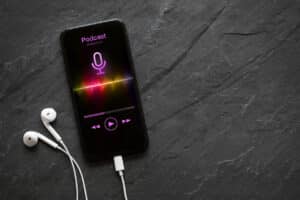For tens of thousands of years, music has been an important aspect of human existence. So much so, that our brains are now wired to react to music without us even realizing it. When used properly, this can be a huge advantage to runners. So can music actually make you run faster? And if so, how? Let’s take a look at how Britney Spears or The foo Fighters can potentially help you hit a new personal best.
In a nutshell, yes, music can make you a faster runner, for a variety of different reasons. Music has been scientifically proven to boost your physical performance, your endurance, and even aid in your recovery. The most obvious reason that people use music is probably the most common reason too; it simply makes exercise of any kind, but especially repetitive endeavors like running, much more enjoyable. Some people simply won’t run or exercise without their music, while others prefer to listen to it sparingly.
A 2012 study showed that cyclists listening to music use 7% less oxygen than the other cyclists who were riding in silence. While that study was done on cyclists, runners can take away the same conclusion; music can help to improve your running performance.
Music for Pace and Speed

One of the simplest ways that music can make you a faster runner is by using it as a guide for your pace. By finding songs with the same beats per minute (BPM) as you want to take steps per minute (SPM), you can get locked into the perfect pace very easily.
If you are a runner who struggles to consistently hold a steady pace, especially without constantly staring at your watch, this can be a great method to get you locked into your goal pace.This is also a great method for pacing if you don’t wear a fitness watch at all.
Listening to upbeat music can help you to run faster, and for longer, too. Music has been proven to distract our brains from the discomfort that our bodies are feeling, if only temporarily.
By distracting our brains, we can push through the pain we are feeling and keep going for much longer than we thought. Music becomes the main focus of your brain, and it forgets about the discomfort it is experiencing.
Music for Motivation
Music is a great motivator too. How many times have you been in a less than perfect mood, and then one of your favorite songs comes on, and your mood is instantly better. Music can have this exact effect during a run too.
Some runners will have specific playlists for certain workouts. For example, some might have a playlist specifically for running hill repeats.
It would probably be filled with up-tempo music that you can’t help but move to, as opposed to slower, less upbeat music that might be used on a long, slow run or for recovery.
Others may just have multiple running playlists that they’ll hit random and let play for their entire run. Other runners who don’t listen to music for their entire runs may have a playlist ready to go just in case they start to get tired, or disinterested in their run. Playing some music, even for just a few minutes, can give runners a huge psychological boost.
Music as a Distraction
One of the main reasons that runners use music so often during runs is its ability to distract us completely from what we are doing. A good song or playlist can completely take your mind away from the task at hand, even if that task is to run 10 or 20 km.
Music can take your mind off of the run, and distract your thoughts to the point that you don’t even notice how tired you’re getting right away.
Music can help drown out the fatigue signals that your body sends when you are getting tired, allowing you to push past that point comfortably.
During a high-intensity workout, you may not feel nearly the same effects, but during medium to low-intensity runs or workouts, music can have a distracting effect that can help trick your brain into forgetting that it’s hurt, tired, etc.
Music for Recovery??
Believe it or not, music can even have some benefits on a runner’s recovery too. Slower-tempo music can help relax you. Listening to a slow song while you stretch after a run can help lower your heart rate and blood pressure, all just from hitting play on your phone before you stretch.
A study done in 2010 tested runners with 3 different scenarios for recovery; no music, slow music, and fast music. The study concluded that music did speed up recovery, and that slow music was the most effective overall, regardless of gender or musical preference.
Does All Music Have the Same Effect?
The short answer to that question is no. Variables like the type of music, beats per minute, and volume can all have different effects on our brains.
The type of music you choose to play can have a huge impact on the effects that it has on your workout. Slow, methodical music like classical or opera won’t have the same benefits as some fast, upbeat, louder music like rock or pop music.
This benefit does seem to decrease slightly once the music gets over 145 BPM though. The beat can also make a difference too, as you’ll often find that your body will try to lock into the same beat as the music, often without you realizing it right away.
The volume that you listen to your music can also make a difference. Loud music can boost your energy levels more than quiet music, but it is very important not to become a “deaf runner”, someone who has their music so loud that they are completely deaf to everything going on around them. This can be incredibly dangerous in certain situations and should be avoided.
Why Don’t the Elites Listen to Music Then?
If music has proven to make you a faster runner, why don’t the elites use it during races then? There are several reasons why they don’t. First, music has been proven to lose its benefits during high-intensity runs and workouts, which is the level of intensity that most elite runners train and race at.
There may be some slower workouts during their training cycle where they may use music, but during high-intensity runs, there isn’t nearly as much benefit.
Another common reason they don’t listen to music during runs is that some races don’t allow it. They need to be able to hear and comprehend what is going on all around them and having headphones in would take away from their capacity to do that. (The USATF banned headphones from competition in 2007, but later changed the policy to include only runners who were “competing for Championships for awards, medals, or prize money”) Some elites simply prefer to listen to their bodies during a race, and music would take away from their ability to do so.
Tips for Running with Music
- Use one earbud, rather than two, so you can still hear ambient noise, and any possible dangers, around you. This is especially important in busy places, high traffic areas, and secluded places where wild animals need to be taken into account.
- Try bone conduction headphones, such as Aftershokz. Bone conduction headphones don’t go over your ears or play music out loud, so you are still able to hear everything that is going on around you. Read about them here.
- Don’t always have your music at full volume. Not only is it bad for your ears, but it can stop you from hearing the things that are happening around you, which is dangerous.
- Having playlists set up and ready to go for certain situations can help you get through tough sections of a run.
Frequently Asked Questions
Most music will help you run faster, depending on how you use it. Music with beats in the range of 120-130 BPM is best for faster, tempo runs. Just keep in mind that with music over 145-150 BPM, the benefits of music can be lost on most runners.
This is a personal choice; some runners will only run with music, and others don’t even notice if they don’t have any music.
Other runners will listen to music depending on their run location; while running in the forest they may turn the music off, but once back out on the road the earbuds go right back in and the music goes back on.
If you always listen to music, it may not have the same benefit at the moment if you try to use it to pull through a rough patch.
These days there are a lot of different options for taking your music with you on a run. Most people use their phones, as they usually take them on their runs with them anyways.
Another popular option is some fitness watches will now hold music as well, so you can stream right to your Bluetooth headphones without having to carry your phone at all. If none of those options work, a small MP3 player can be carried in a running belt or pack very easily.
Conclusion
No matter what your musical preferences are, music can help you to become a faster runner. The important thing is to find some music with an intensity and BPM similar to the workout that you are planning on doing.
By matching your music to your workouts, you can get the most benefit out of all your runs, and the maximum enjoyment too, as you’ll be setting new PB’s while listening to some of your favorite songs.
RELATED ARTICLES














































